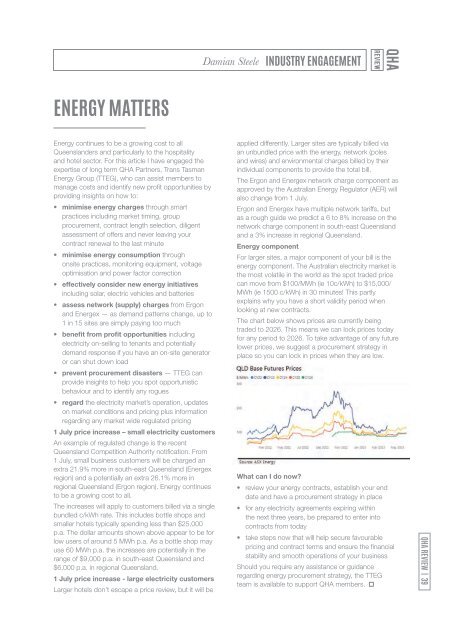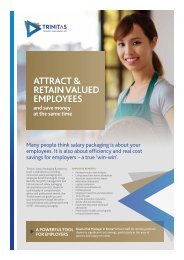QHA-Review_July_digital
Create successful ePaper yourself
Turn your PDF publications into a flip-book with our unique Google optimized e-Paper software.
Damian Steele<br />
INDUSTRY ENGAGEMENT<br />
ENERGY MATTERS<br />
Energy continues to be a growing cost to all<br />
Queenslanders and particularly to the hospitality<br />
and hotel sector. For this article I have engaged the<br />
expertise of long term <strong>QHA</strong> Partners, Trans Tasman<br />
Energy Group (TTEG), who can assist members to<br />
manage costs and identify new profit opportunities by<br />
providing insights on how to:<br />
• minimise energy charges through smart<br />
practices including market timing, group<br />
procurement, contract length selection, diligent<br />
assessment of offers and never leaving your<br />
contract renewal to the last minute<br />
• minimise energy consumption through<br />
onsite practices, monitoring equipment, voltage<br />
optimisation and power factor correction<br />
• effectively consider new energy initiatives<br />
including solar, electric vehicles and batteries<br />
• assess network (supply) charges from Ergon<br />
and Energex — as demand patterns change, up to<br />
1 in 15 sites are simply paying too much<br />
• benefit from profit opportunities including<br />
electricity on-selling to tenants and potentially<br />
demand response if you have an on-site generator<br />
or can shut down load<br />
• prevent procurement disasters — TTEG can<br />
provide insights to help you spot opportunistic<br />
behaviour and to identify any rogues<br />
• regard the electricity market’s operation, updates<br />
on market conditions and pricing plus information<br />
regarding any market wide regulated pricing<br />
1 <strong>July</strong> price increase – small electricity customers<br />
An example of regulated change is the recent<br />
Queensland Competition Authority notification. From<br />
1 <strong>July</strong>, small business customers will be charged an<br />
extra 21.9% more in south-east Queensland (Energex<br />
region) and a potentially an extra 26.1% more in<br />
regional Queensland (Ergon region). Energy continues<br />
to be a growing cost to all.<br />
The increases will apply to customers billed via a single<br />
bundled c/kWh rate. This includes bottle shops and<br />
smaller hotels typically spending less than $25,000<br />
p.a. The dollar amounts shown above appear to be for<br />
low users of around 5 MWh p.a. As a bottle shop may<br />
use 60 MWh p.a. the increases are potentially in the<br />
range of $9,000 p.a. in south-east Queensland and<br />
$6,000 p.a. in regional Queensland.<br />
1 <strong>July</strong> price increase - large electricity customers<br />
Larger hotels don’t escape a price review, but it will be<br />
applied differently. Larger sites are typically billed via<br />
an unbundled price with the energy, network (poles<br />
and wires) and environmental charges billed by their<br />
individual components to provide the total bill.<br />
The Ergon and Energex network charge component as<br />
approved by the Australian Energy Regulator (AER) will<br />
also change from 1 <strong>July</strong>.<br />
Ergon and Energex have multiple network tariffs, but<br />
as a rough guide we predict a 6 to 8% increase on the<br />
network charge component in south-east Queensland<br />
and a 3% increase in regional Queensland.<br />
Energy component<br />
For larger sites, a major component of your bill is the<br />
energy component. The Australian electricity market is<br />
the most volatile in the world as the spot traded price<br />
can move from $100/MWh (ie 10c/kWh) to $15,000/<br />
MWh (ie 1500 c/kWh) in 30 minutes! This partly<br />
explains why you have a short validity period when<br />
looking at new contracts.<br />
The chart below shows prices are currently being<br />
traded to 2026. This means we can lock prices today<br />
for any period to 2026. To take advantage of any future<br />
lower prices, we suggest a procurement strategy in<br />
place so you can lock in prices when they are low.<br />
What can I do now?<br />
• review your energy contracts, establish your end<br />
date and have a procurement strategy in place<br />
• for any electricity agreements expiring within<br />
the next three years, be prepared to enter into<br />
contracts from today<br />
• take steps now that will help secure favourable<br />
pricing and contract terms and ensure the financial<br />
stability and smooth operations of your business<br />
Should you require any assistance or guidance<br />
regarding energy procurement strategy, the TTEG<br />
team is available to support <strong>QHA</strong> members.<br />
<strong>QHA</strong> REVIEW | 39
















